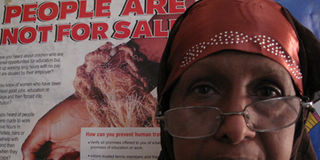Premium
Poverty fuels human trafficking in Kenya

Anti human trafficking activist Amina Kinsi fights the crime with the only weapons at her disposal. The vice is growing rapidly with Kenya's underground networks estimated to generate an estimated millions of U.S dollars annually.
What you need to know:
- The crime is prevalent in all regions of the country, but poor parents are known to coerce their children into prostitution. The situation is further exacerbated in northern Kenya by the frequent drought that increases the presence of cheap labour.
Kenya's refugee rights organizations and aid agencies have blamed poverty in the East African region for the rising cases of human trafficking.
They said that the huge supply of labour, both skilled and unskilled, makes them vulnerable to criminal syndicates.
Refugee Consortium of Kenya (RCK) Information Officer Andrew Maina said on Thursday that studies indicate that at least 50 girls between the age of 10 and 15 every week are sold to serve as sex workers in the main towns of Kenya.
He noted that trafficking does not only target minors but women as well. "The vice is growing rapidly with Kenya's underground networks estimated to generate an estimated 40 million U.S. dollars annually," he said.
The crime is prevalent in all regions of the country, but poor parents are known to coerce their children into prostitution. The situation is further exacerbated in northern Kenya by the frequent drought that increases the presence of cheap labour.
The victims normally have no access to freedom of movement as well as any other fundamental rights. RCK Legal Officer Dennis Likule said that the country's tourism industry also plays a role in promoting the trafficking. "Kenya's coastline has become a sex tourism destination with minors becoming victims," Likule said.
He added that there are also cases of people who migrate in order to access better socio- economic opportunities. In addition, he noted that Kenyans voluntarily go to the Middle East region in search of employment and sometimes end up being exploited. But the east African nation has also taken steps to combat the crime.
The 2010 Counter-Trafficking in Persons Act proscribed stiff penalties of up to 357,000 dollars fine or 30 year jail term for any one convicted of the offense.
Human smuggling is common and involves providing assistance for entry of a person into a country illegally. Likule added that international migration has been a common global phenomenal since time in memorial.
According to the International Organization of Migration (IOM), up to 20,000 Somali and Ethiopian immigrants are smuggled into Kenya annually with the South Africa as their final destination.
However, globally approximately 600,000 to 800,000 persons are trafficked annually, with 80 percent of victims being female.
However, states do exercise control over their territory through issuance of visas or permits but forced migrations across border affects this mandate. International Rescue Committee Protection Officer Grace Awino said that refugees in Kenya are still vulnerable despite the legislation put in place.
Following concerted effects by the civil society, parliament passed the Refugee Act in 2006.
The legislation domesticated all UN conventions relating to refugees. United Nations Convention on Refugees notes that countries are under obligation to process a person's application for asylum, regardless of whether the person arrived legally or illegally. In addition, people should not return to a place where their life is at risk or to be refused entry at the border.
However, international refugee protection instruments don't provide persons engaged with terrorism with a safe haven. The UN established the Universal Declaration on Human Rights in 1948 to protect the rights of all humans, but the status of refugees was further enhanced by the 1951 convention on refugees that set the minimum standards for forced migrants.
In Africa, the predecessor of the African Union, the Organization of African Unity passed a Convention in 1969 to address the specific challenges to the continent.
RCK programme officer Rufus Karanja said that refugee status is a temporary status and comes to an end if the situation in home country is improved, if the refugee acquires new nationality or voluntarily moves back to the home country.
RCK deputy programme officer Riva Jalipa said that the country currently host 600,000 refugees, with most of them from Somalia, Ethiopia, Democratic Republic of Congo and South Sudan.Jalipa added that since the end of last year, the government stopped registering new refugees due to safety concerns.
Jalipa said that conflict is the most common cause of displacement. "However, country partition makes a lot of people stateless," he said, adding that most displacement lasts on average 17 years.
Xinhua




